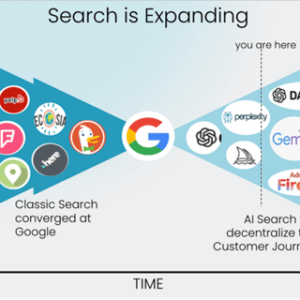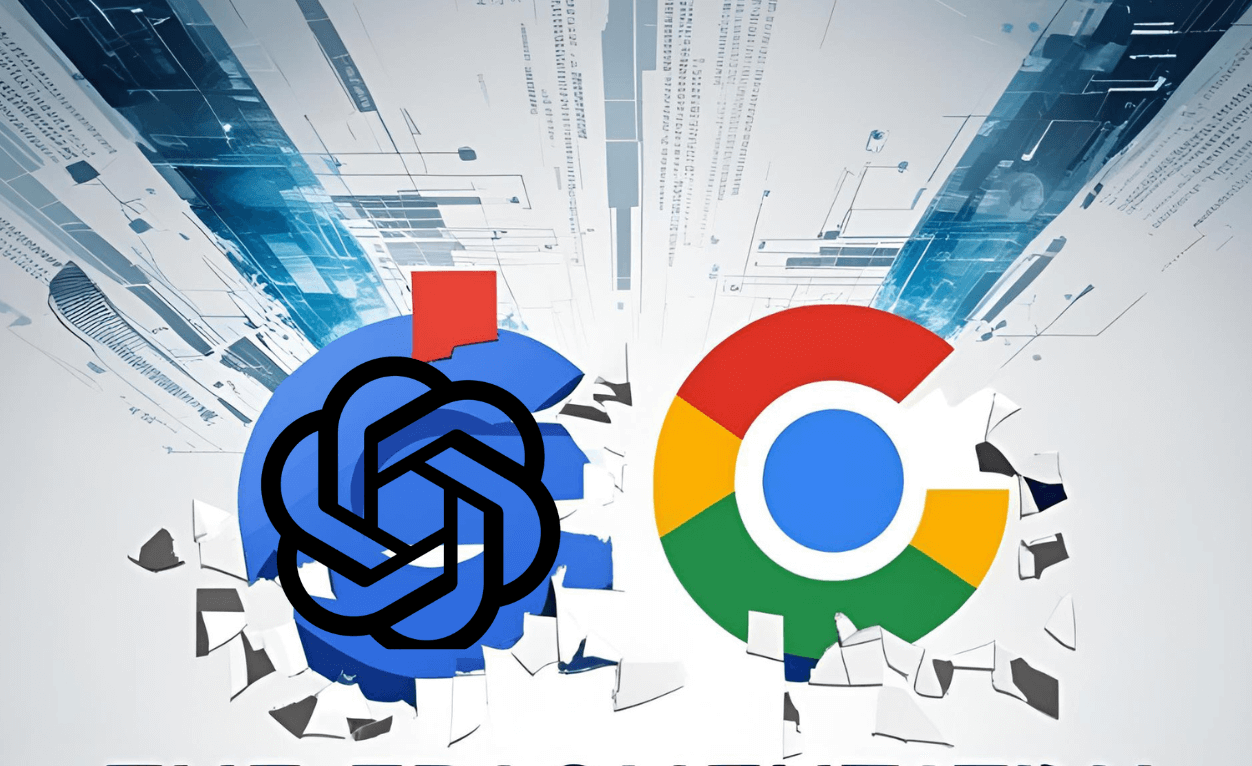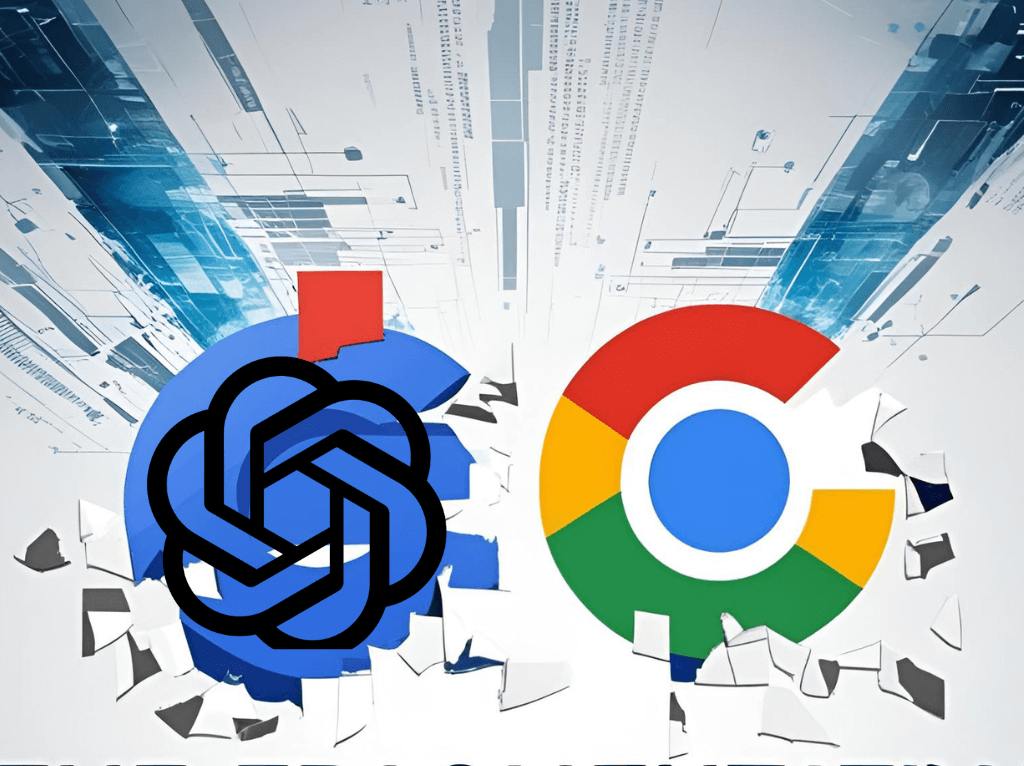The world moves in cycles, and technology, innovation, and search marketing are no different. We are moving in a cycle now that can be perfectly described as a Hegelian Dialectic: search is now in an antithesis stage that will drive us toward a new synthesis that expands search to all nodes of everyday life and makes SEO (what we believe will become AI Optimization) the dominant marketing activity for every brand. This cycle is the greatest opportunity for the future of SEO since the launch of Google Maps in 2005 – SEO is on the precipice of transformation into optimization for more than just general search engines: it’s poised to be pushed into an era of AIO (AI Optimization) as LLMs become the prominent method of consumer search.
The Hegelian Dialectic model gives us a perfect lens for these changes in the search market. The model hypothesizes that the world moves in a cycle with three stages:
- The Thesis Stage: One idea is dominant at the time.
- The Antithesis Stage: A reaction/opposition to the dominant idea grows.
- The Synthesis Stage: A new thesis that combines the dominant and antithesis ideas becomes the new dominant idea.
There’s more than anyone could need to understand about this model on Stanford’s Hegel Dialectics website (I also recommend getting your favorite LLM to summarize it for you, much faster). We can apply this model to the current web search market in this way:
- The Thesis: Before Google, search was fragmented into many keyword/directory-focused players like AltaVista, Yahoo, Excite, etc. Then Google launched in 1998 and provided a better experience with improved contextuality of links, content, and other ranking signals (e.g., PageRank). The enhanced experience consolidated the entire market into the Google search market (+90% market share).
- The Antithesis: The recent launch of ChatGPT and expansion of LLMs is a push back against the classic concept of search. Moving from summarization of the internet into helpful responses vs. the traditional blue links of Google search takes the burden (and time) of research off the user’s plate and moves it to the machine. The rapid adoption of ChatGPT and Google’s move towards AI Overviews/AI mode shows that this model is vastly superior to Google’s traditional search for several query types (local search traffic is still resistant to AI search, but that is only a matter of time).
- The Synthesis: The popularity of AI tools forces the market into a new hybrid experience that provides the deep insights of links but the summarization capabilities of AI across many different mediums beyond just search engines (the true promise of conversational search is near!). The power of AI models to understand language in multimodal formats will set the new paradigm for search being used in more contexts than just a webpage and ten blue links.
Christian Ward, Yext’s Chief Data Officer, recently wrote further on this cycle and has a great graphic that summarizes the above better than anyone I’ve seen.

So why does this matter? It matters because we are in the synthesis stage of the cycle, which is bringing the context of search everywhere. Search will no longer be confined to a web browser. Search will be your phone, your Alexa, your home! The power of LLMs (especially with memory features) will expand search into a constant back-and-forth with our favorite LLMs that will tailor experiences for us based on the summarization of the internet, refined in the context of our personalized memory within that LLM system. It will mean that for any electronic device that we interact with in the future, there will be an expectation that it will understand our specific personalized LLM memory and interact with us using our preferences. Search won’t be just on your phone or laptop, it will be everywhere. Since we are at the start of this synthesis stage, it is a great moment for us to capitalize on this trend.
Local SEO is helping local businesses find visibility in local directories (Yelp), local search engines (Google), and local map products (Google Maps, Apple Maps, etc.). Local AIO is the same concept as SEO, but it will help local businesses find visibility in LLM/AI tools. SEO is search engine optimization. AIO is artificial intelligence optimization. The tactics for AIO are the same as SEO. No one knows for sure yet, but there is growing evidence that similar tactics/execution that work for local SEO are effective for local AIO (to what degree is still being determined). This makes sense because the way that LLMs structure and classify the internet is similar to search engines. Additionally, the growing use of RAG for LLMs points towards convergence between SEO and AIO, not divergence. The work we are all doing to drive SEO (technical site structuring, EEAT content creation, etc.) will help us optimize for LLMs. As LLMs grow in popularity, so will SEO as a way to find visibility in the LLM model.
We are just at the beginning of the antithesis stage, moving into a new synthesis stage. LLMs, Agentic AI, and robotic tools in the real world will all be leveraging AI in ways that are novel to our understanding of AI today. This continued growth in LLMs/AI will only benefit the SEO world and those companies that embrace using local SEO to drive local AIO. We believe that AIO (which is why we are launching AIO Reseller later this year) will take the core principles of SEO and expand to new markets to drive an SEO growth explosion never before seen. Get ready for the AI-powered ride in SEO, it’s starting now.





